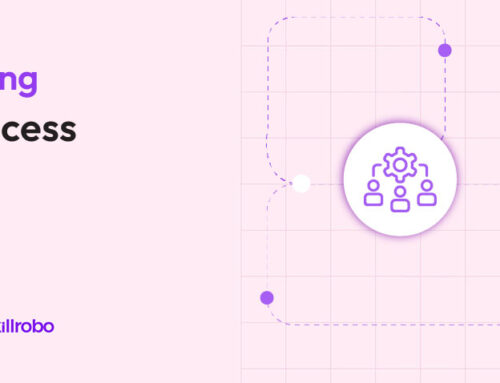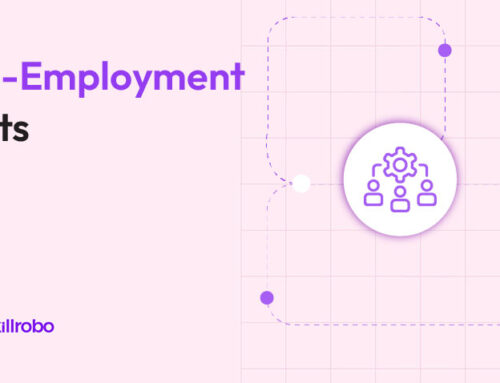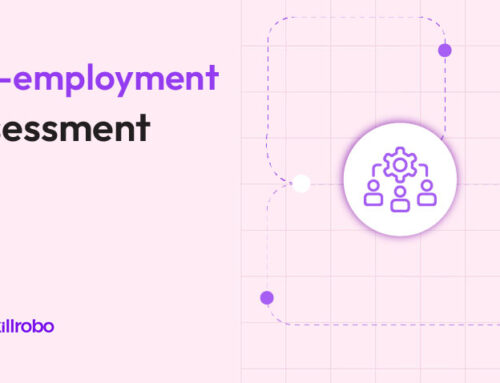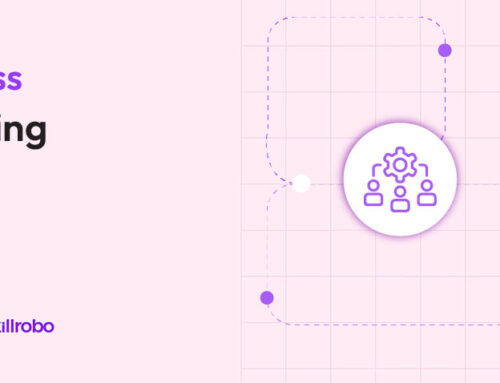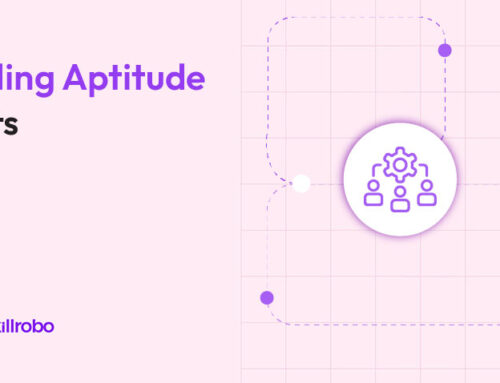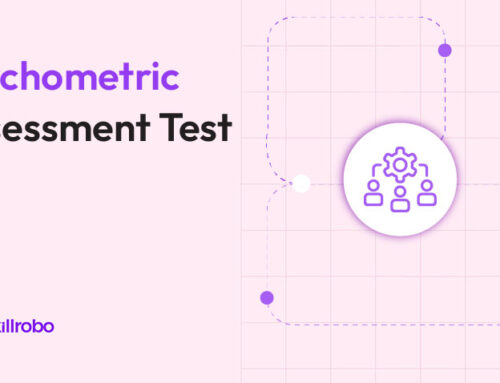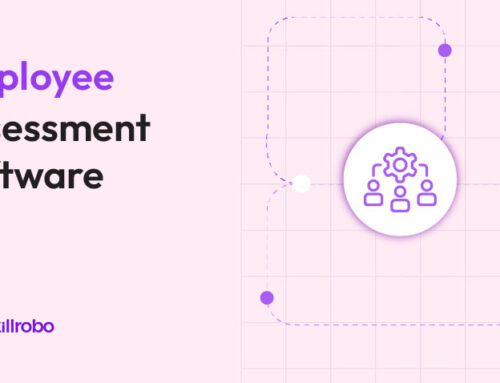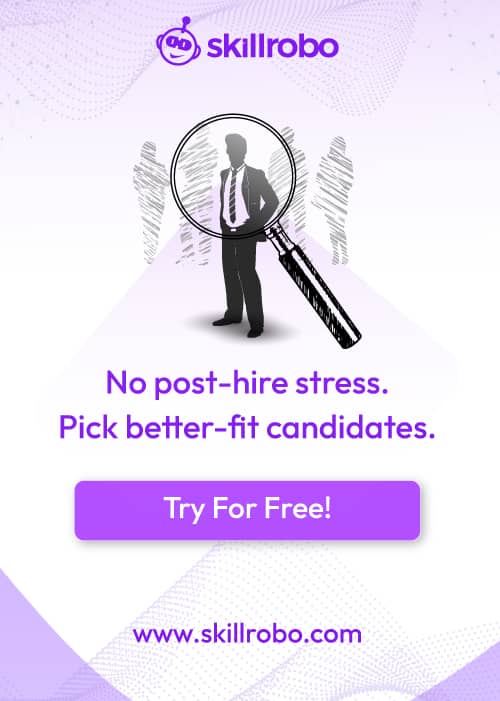Table of Contents
Related articles
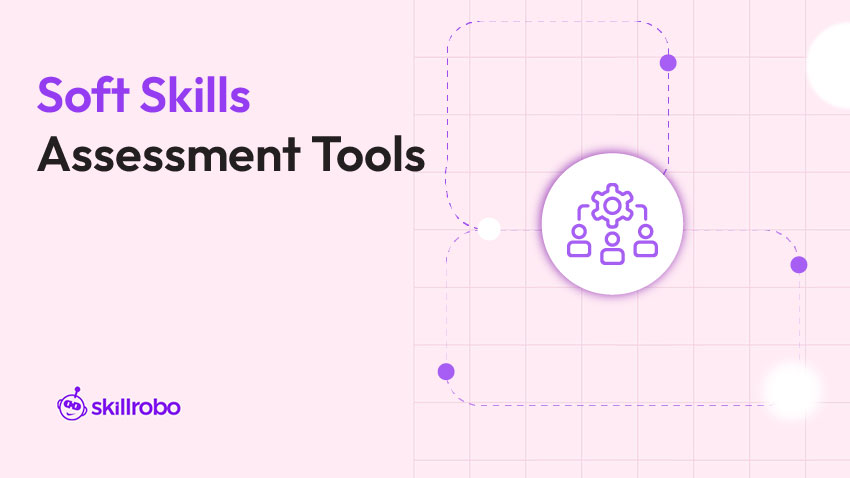
Soft skills are equally important for both higher-position employees and fresh candidates. Each level has various requirements and obligations, and the soft skills that are most crucial to develop throughout a career may change, but everyone needs them to function well at work. They are so essential that employers are increasingly looking for applicants who possess strong soft skills in addition to the technical qualifications needed for a post.
A designer may learn the workings and limitations of new graphic design software, similar to how a coder can learn a new programming language. However, if the new employee can’t speak politely and clearly, they’ll interfere with business as usual. So, soft skills are the essential thing to consider when hiring a potential employee for your team.
Every organization should identify the job role that requires soft skills and implement the soft skill assessment effectively. With soft skills assessment tools, employers can determine the candidate’s ability in specific soft skills tests. Further evaluations are done by the soft skills specialist or the employer who hired the candidate.
Examples of soft skills are critical thinking, time management, work ethic, problem-solving, teamwork, etc. Let’s take a closer look at the subject of soft skills assessment, starting with a discussion of what soft skills assessment is, as well as the types, importance, and top 10 tools available today.
What Is Soft Skills Assessment?
Soft skills assessments are designed to evaluate the candidate’s strengths and weaknesses in soft skills. This tool helps recruiters to identify the areas where the employee has to improve their soft skills which leads to the enhancement of overall performance. Additionally, it will highlight your strengths in soft skills so you may better grasp how to impart such admirable traits to others.
Usually, employers focus only on hard skills when hiring a candidate, but it is important to look deep inside the soft skills of the candidate. For team leaders and managerial personnel to manage others more successfully, soft skills are very crucial. Soft skills training should be viewed as a crucial component of the hiring process because these abilities may be acquired with the proper instruction.
Building and maintaining solid and healthy relationships with clients and coworkers requires skills like emotional intelligence and conflict management. There are several benefits to investing in employees’ soft skills by identifying and developing those who excel in hard skills.
Types Of Soft Skills
To match the demand for personalization and empathy within a client base, companies require people with great soft skills. For workers, especially employees, and contractors who work remotely, soft skills are even more essential.
1. Communication Skills
Communication skills and assessments are essential for positions like customer support and back-office roles. Any team environment can suffer greatly from a lack of good communication, and miscommunication can quickly result in unneeded disputes.
2. Problem-solving Skills
Both higher- and lower-level employees can benefit from having problem-solving abilities, such as critical thinking. There will always be challenges at work, and the recruiter doesn’t want to recruit someone whose hand they’ll have to hold every step of the way.
3. Teamwork
The rising diversity of modern business requires teamwork and an open mind to other people’s views. Some people work incredibly productively when they are themselves. But it’s important to find someone who can handle both without getting too competitive.
4. Interpersonal Skills
The term “interpersonal skills” refers to a broad range of soft talents needed to establish and maintain relationships. A person with good people skills will be able to empathize with others, respect their ideas, and successfully convey and understand constructive criticism. They will also be able to maintain a diplomatic position with everyone. In the workplace, conflicts will arise, but a person with good people skills will be able to handle the situation and find a solution without consulting upper management.
5. Work Ethic
Employees with a strong work ethic are in great demand because they are trustworthy and committed to carrying out their obligations to the best of their abilities. This entails routinely meeting deadlines and exhibiting readiness to put in extra work when required.
Importance Of Measuring Soft Skills
It is obvious that soft skills are more important than hard skills in digital technology. According to the World Economic Forum’s “Future of Jobs” report, by 2025, the workplace will place a significant emphasis on critical thinking, complex problem-solving, people management, emotional intelligence, and creativity.
Soft skills are extremely beneficial in contributing to Return on Investment (ROI), in addition to job success. They have an impact on a company’s employee retention rates since, more often than not, a technically sound hire may lack the necessary soft skills and therefore underperform.
Nowadays, when technology controls every aspect of our lives, soft skills are as desperately needed as they are important. Employers are motivated to consider soft talents while hiring because of this. The majority of businesses are prepared to provide technical training for new workers, but they favor applicants with a strong set of soft skills.
Soft skills assessment tools provide information and insights that have a positive impact on the hiring and retaining processes as well as on the engagement of the talent pool inside the organization. In turn, this gives businesses a clear advantage over rivals.
Methods To Assess Soft Skills
1. Soft Skills Self-Assessment
This tool is also known as the self-reporting tool, one of the methods of soft skill assessment that serves as a marker of soft skills including empathy, communication, teamwork, and problem-solving. The most popular ways to distribute them are through questionnaires and surveys.
2. Survey of Employee Engagement
These surveys gauge how dedicated workers are to their jobs and employers, which in turn indicates the manager’s capacity to promote positive office dynamics.
3. 360-Degree Feedback
These feedback tools are used to gather opinions from those who engage with the issue most frequently. Tools for providing feedback are quite insightful and can be very successful in assessing soft skills.
4. Developing definite Rubrics
Employers can investigate candidates’ responses to a soft skills test because of the creation of detailed rubrics that define outstanding, acceptable, and unsatisfactory degrees of soft skills. Soft skills are challenging to measure.
How Do Recruiters Assess A Candidate’s Soft Skills?
Comprehensive soft skill assessment is a well-thought-out methodology with several components. Even though soft skills are applicable in all fields and positions and are universal, some jobs call for a particular skill set.
For example, a customer support specialist necessitates better communication abilities than originality in problem-solving. Employers must therefore determine the soft skill needs of a work role to evaluate soft skills assessment tools.
Online pre-screening is the next phase, where technology helps lighten the load. Online applications can readily incorporate pre-screening techniques, such as situational inquiries or games with neuroscience themes, whose outcomes are then analyzed using the software’s algorithm.
Employers must be wary of unintentional bias while evaluating a candidate’s soft skills. Implicit biases are especially dangerous because, after the initial favor is established, employers are more likely to pay attention to characteristics that support that bias. This can be reduced by utilizing the right soft skills assessment tools in the hiring process.
Standardizing the interview questions is also an essential part of measuring soft skills. Behavioral or situational interview questions can be useful in identifying soft talents, but they must be used consistently by all applicants. This assures that each applicant has the chance to demonstrate their abilities, making it simpler for employers to compare the responses.
Problem-solving inquiries can also be used in conjunction with situational inquiries to evaluate soft skills. Using these kinds of questions, recruiters can evaluate a candidate’s aptitude for problem-solving, composure, and openness to change.
Top 10 Soft Skills Assessment Tools In the Market
1. Skillrobo
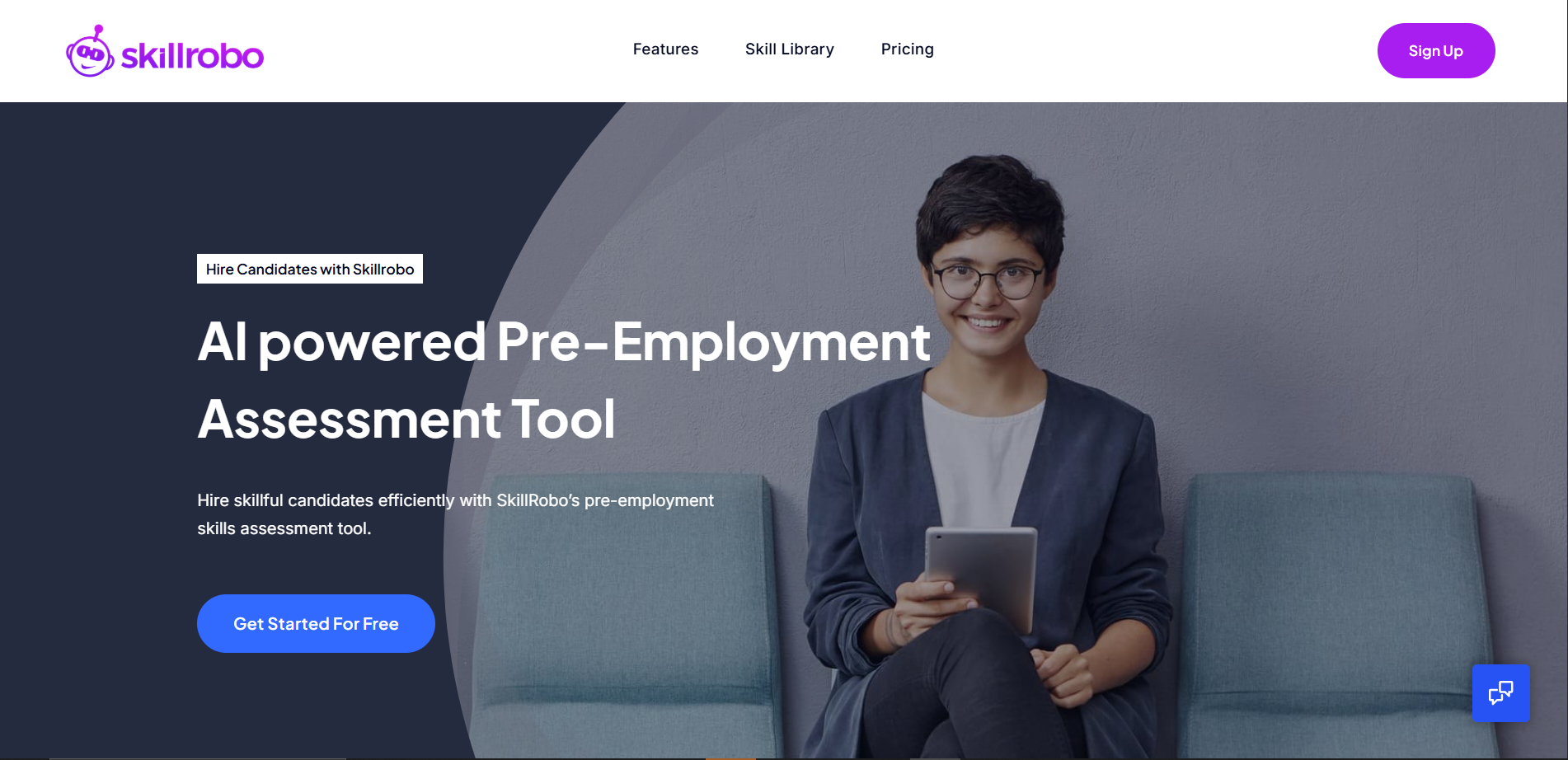
Skillrobo is a pre-employment assessment tool that evaluates candidates’ technical, domain, coding, cognitive, and soft skills before they are hired. Using scenario-based questions that are based on actual workplace interactions, these soft skills assessment tools enable hiring managers and recruiters to determine candidates’ working styles, communication skills, professionalism, cognitive ability, and ethics.
This Skillrobo soft skills testing tool has an expanding collection that includes tests for language proficiency, cognitive ability, personality, and culture.
Features
- Skillrobo pre-assessment software provides cutting-edge soft skills tests for business communications, such as Active Listening, Communication Fundamentals, Cross-Cultural Communication, Presentation, Negotiation, and Persuasion skills.
- This soft skills assessment tool provides the greatest strategies for evaluating soft skills, including adaptability, collaboration, networking, and relationship building, which are used to analyze candidates’ teamwork skills.
- The self-awareness, personal effectiveness, goal-setting, and self-growth portions of the personal development test.
- Skill sets such as problem-solving, customer focus, accountability, time management, conflict management, research skills, critical thinking, strategic planning, emotional quotient, creativity, innovation, and dependability are also important.
2. Bryq
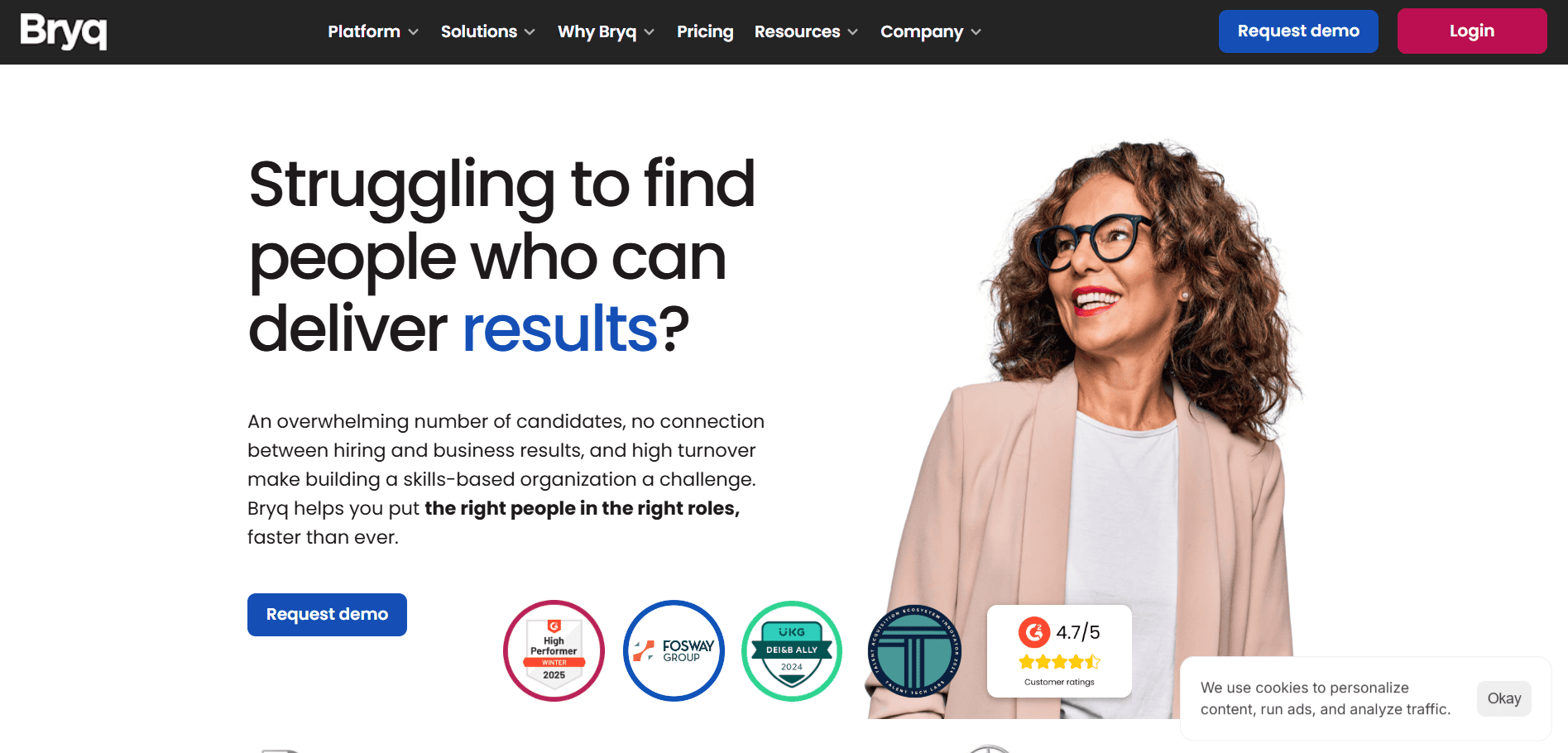
Source: Bryq
Bryq is an upcoming soft skills assessment tool that enables efficient and objective recruiting. Using a combination of core skills and soft skill assessments, the platform strives to develop talent and assist hiring managers in finding skill sets that match.
To help the hiring manager ask the proper questions during the interview, Bryq can evaluate each candidate’s strengths, limitations, and how they stack up against their peers.
Features
- It measures the candidates’ four cognitive abilities: attention to detail, logical reasoning, verbal reasoning, and numeric reasoning.
- It provides the evaluation of behavioral trends using validated personality tests.
- Bryq includes numerous indicators, such as the addition of culture, emotional intelligence, and remote work.
3. Picked
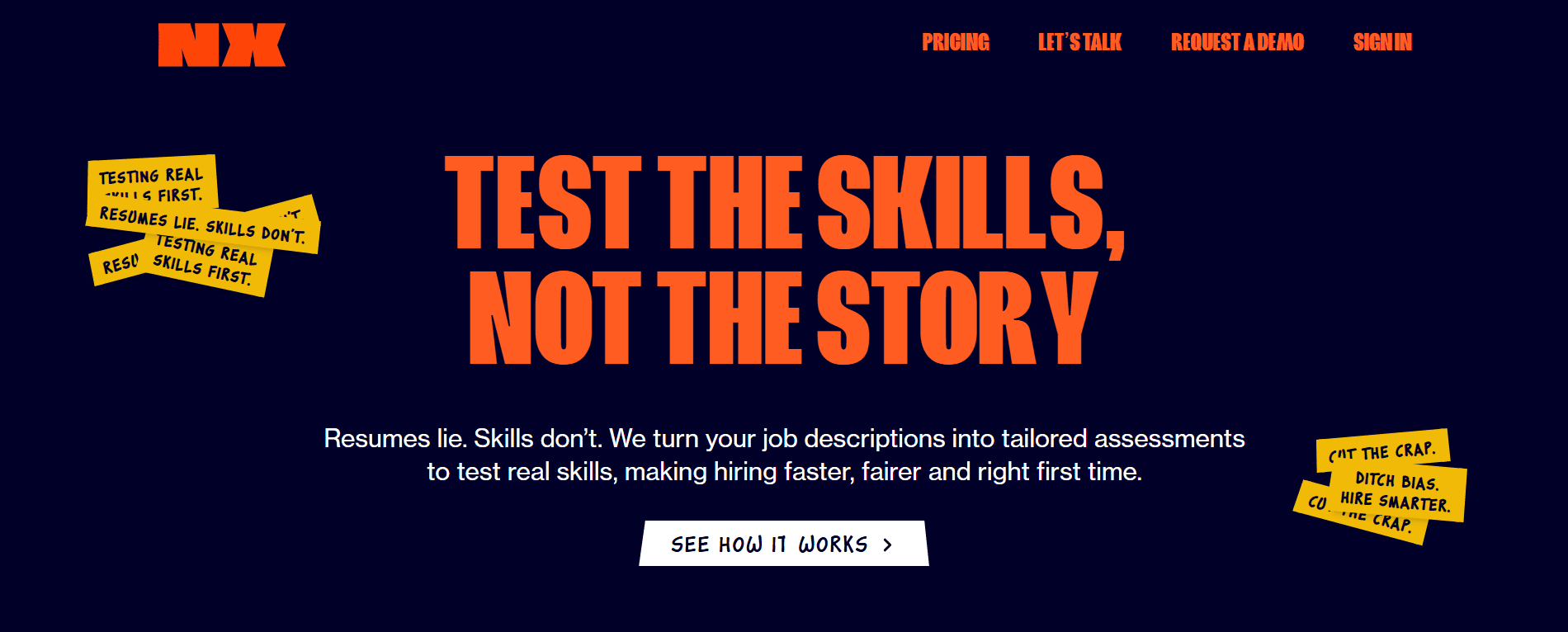
Source: Neuroworx.io
Neuroworx.io is an AI-enabled talent acquisition application that offers a one-stop solution for hiring and managing talent. It assists hiring managers in quickly locating qualified candidates to fill urgent openings.
This tool provides a wide range of soft skills tests. With the help of approved tests, this focuses on legitimate, fair, and trustworthy recruitment.
Features
- It has the feature of integrating a 360-degree review system to manage performance.
- It provides a wide range of pre-employment aptitude tests like Emotional Intelligence, Diagrammatic Reasoning, Abstract Reasoning, Error Checking, Logical Reasoning, Mechanical Reasoning, Numerical Reasoning, Situational Judgment, Spatial Reasoning, and Verbal Reasoning.
- It provides personality tests like the Interest Inventory, the HEXACO Personality Test, and the Drives Test
4. Clevry
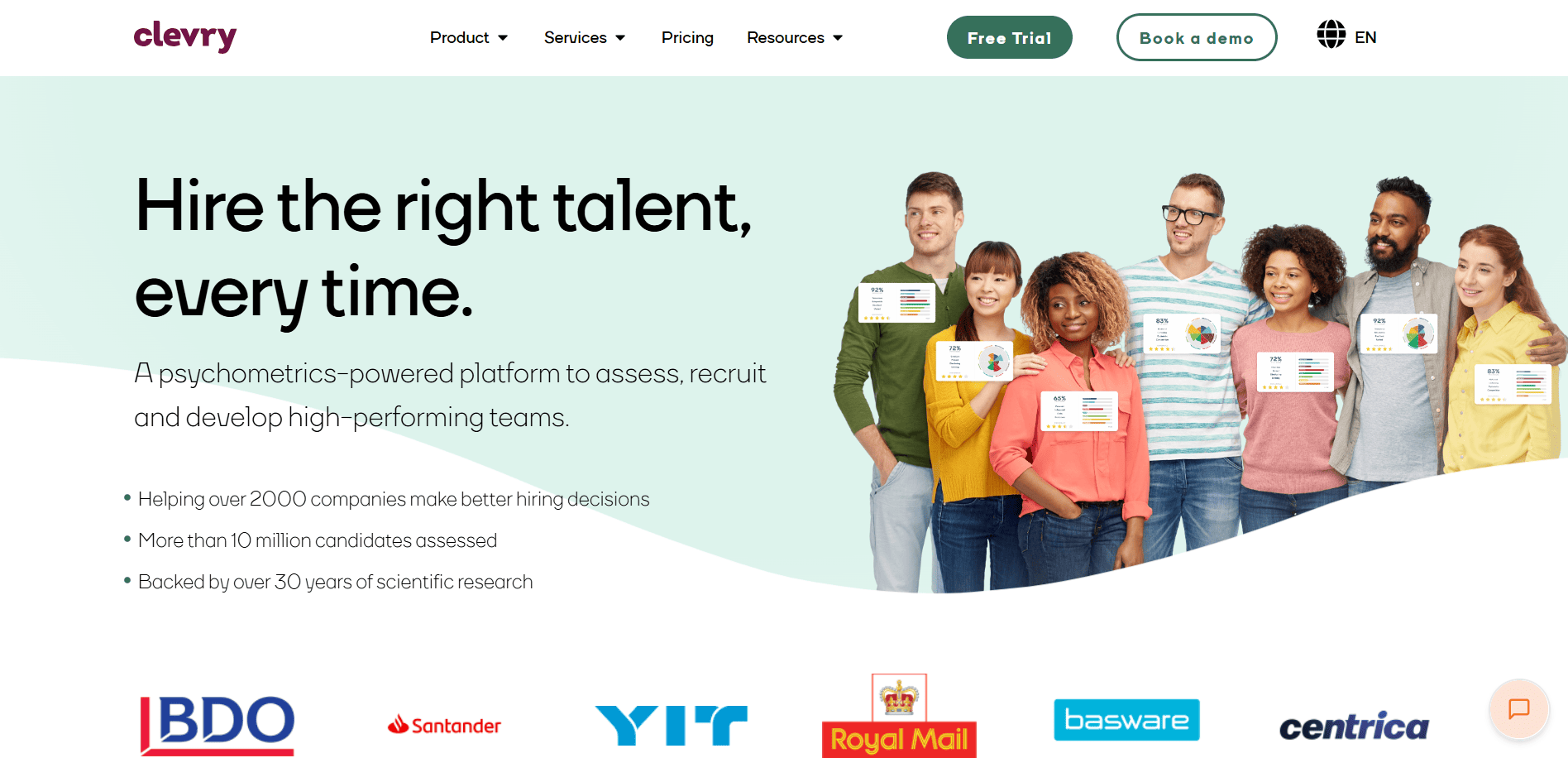
Source: Clevry
Using the user-friendly soft skills assessment tool Clevry, hiring managers may evaluate soft skills objectively. There are more than 46 personality tests that examine candidates’ business cultures. You can also use premade surveys that concentrate on roles relevant to a given industry.
The Clevry platform is simple to design your assessment campaigns for hiring and training purposes. Alternatively, you may hire our team of qualified recruiters and business psychologists to handle the task.
Features
- Clevry soft skills assessment tool provides standard personality questionnaires and ability tests.
- It has a 360-degree feedback feature.
- It has a feature of virtual assessment.
5. Harver
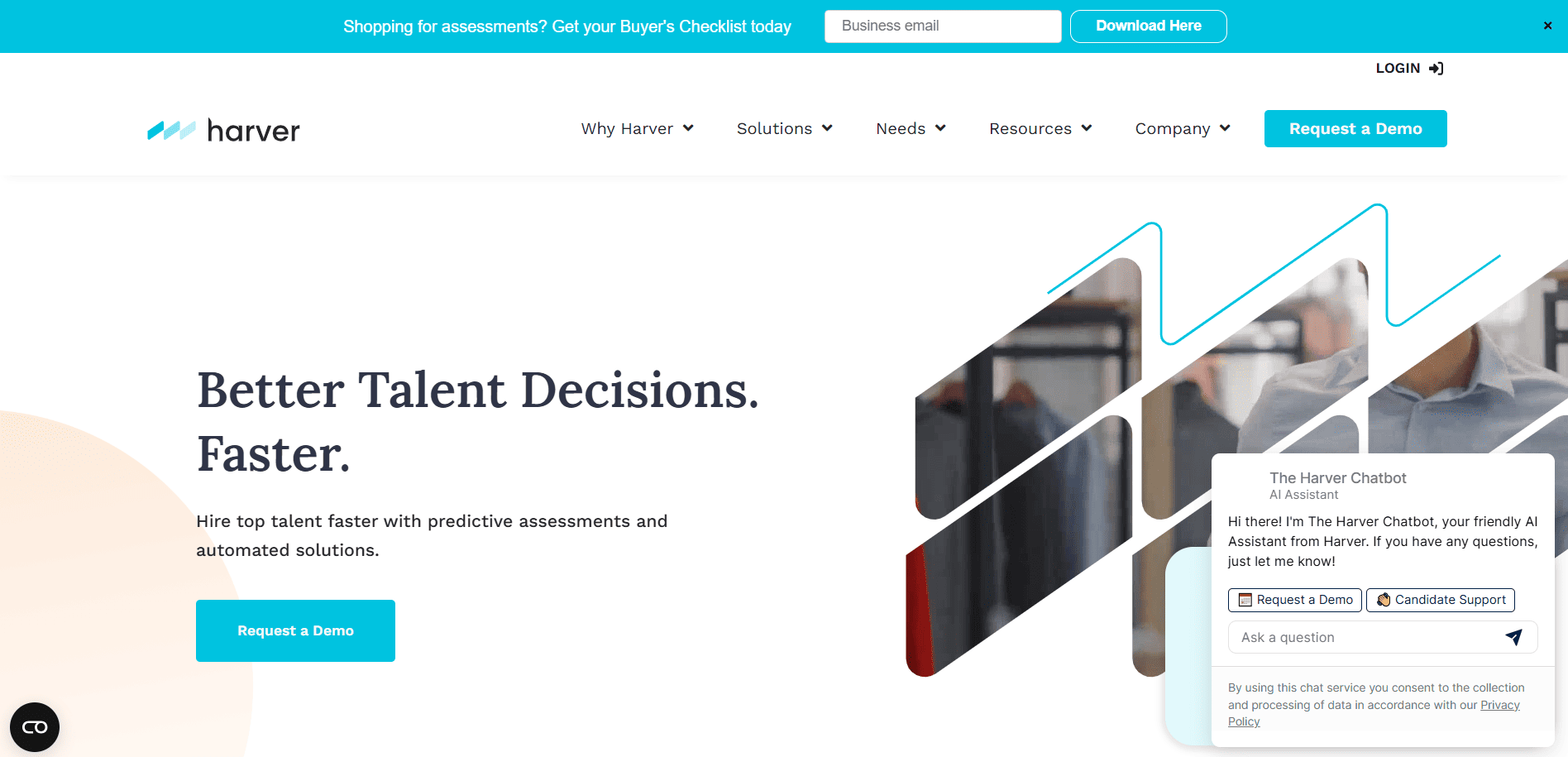
Source: Harver
Harver is an HR management software that streamlines the hiring process through AI technology and behavioral data for businesses. Employers can evaluate candidates using gamified tests and video interviews on the platform, and they can also recommend substitute jobs.
Hiring managers can assess candidates’ emotional behavior, personality traits, and cognitive abilities using pre-built behavior-based games. Additionally, the soft skills assessment tool produces personalized performance reports.
Features
- It helps employers to make decisions without bias across the talent lifecycle by surfacing soft skills data in the HR system.
- It provides the overall report of candidate performance through fair and predictive soft skills analysis data.
6. Merittrac
Merittrac is an online platform for hiring and workforce development. It provides comprehensive end-to-end solutions for businesses in addition to online assessments, admission management, and other exams for universities, government agencies, and other educational institutions.
By offering cognitive, communication, behavioral, and workforce development tests, it excels as a soft skills assessment tool.
Features
- Merittrac has a pre-employment aptitude test to evaluate candidates’ verbal, mathematical, spatial, logical, error-checking, and numerical reasoning.
- It also has psychometric tests that assess values, motivation, and cognitive and personality attributes.
7. HighMatch
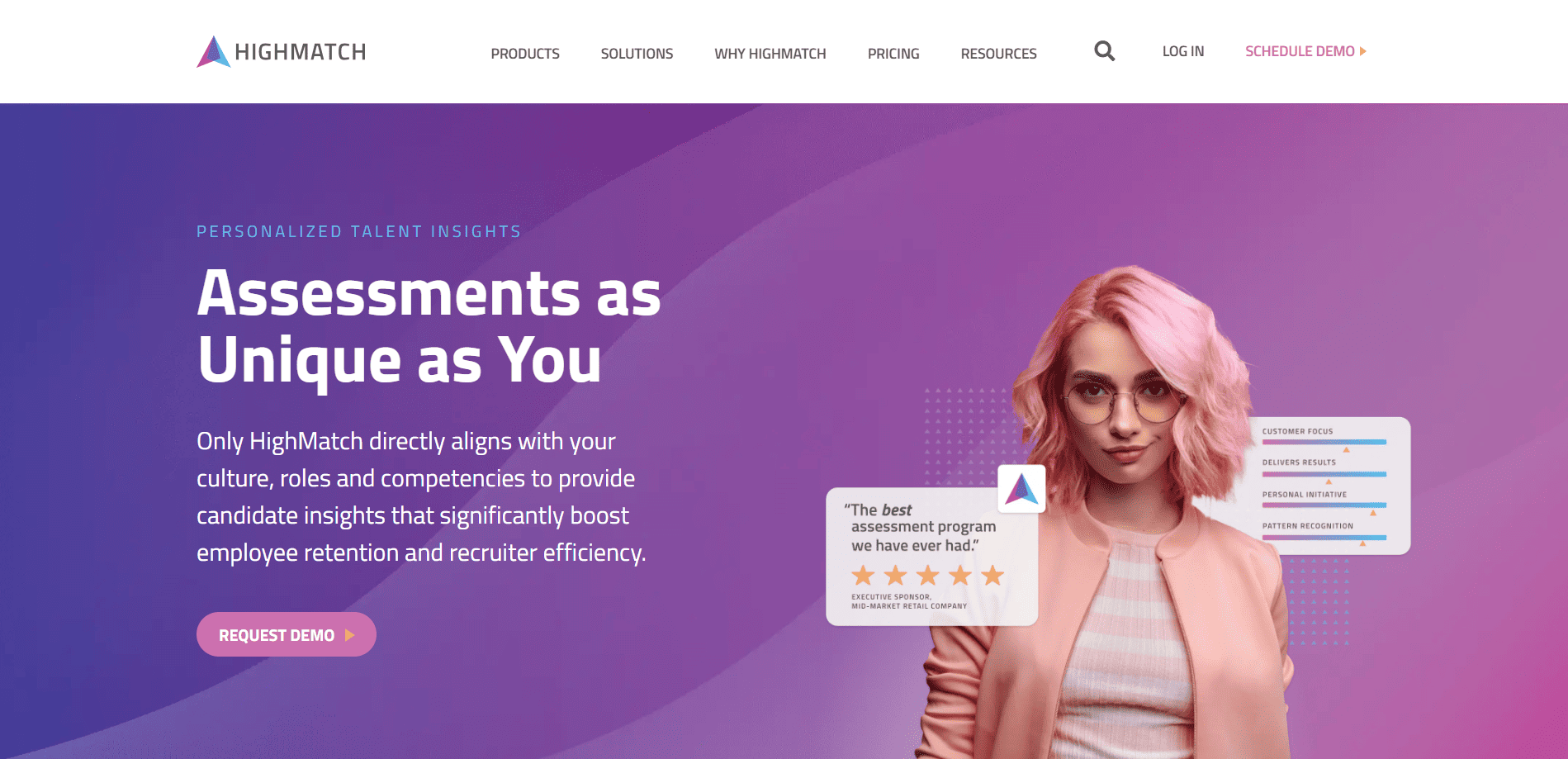
Source: HighMatch
HighMatch approaches hiring evaluation in a cutting-edge manner. To provide individualized insights into candidates at every level of the employment cycle, the team works with in-house psychologists. You can discover better matches as a consequence. It is a technique for measuring soft skills that provides personality assessments to precisely forecast a candidate’s performance on the job.
Features
- The personality test in HighMatch helps to evaluate candidates more quickly and accurately for a certain culture and job.
- It assists in measuring seven distinct characteristics, including adaptability, assertiveness, optimism, intensity, sociability, reactivity, and structure.
- The situational judgment tests reveal insights about a candidate’s aptitude for dealing with difficulties effectively.
8. Retorio
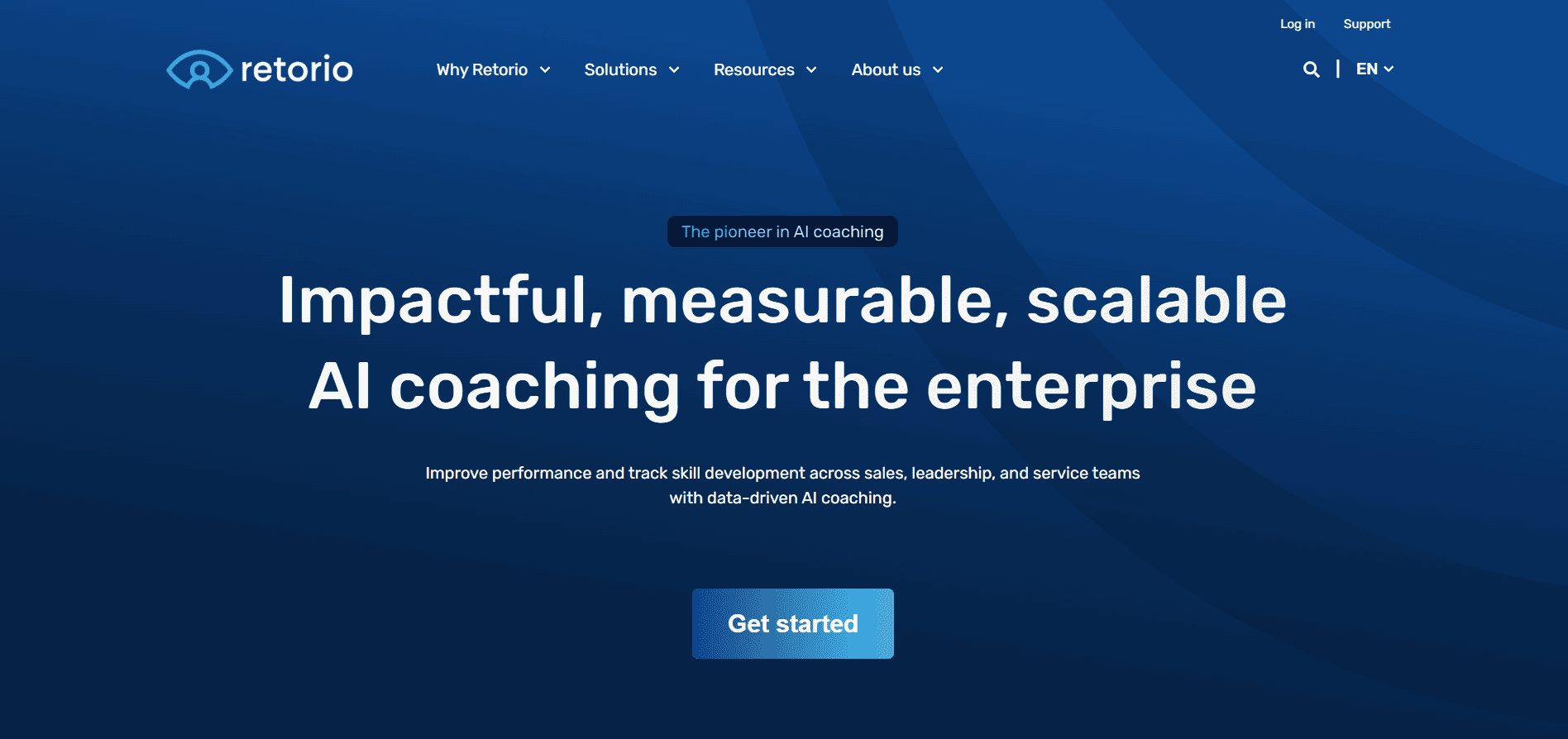
Source: Retorio
Retorio blends leading-edge organizational and psychological research findings with AI and ML. Using cutting-edge video AI to uncover candidates’ personalities elevates the process of hiring and managing employees. Additionally, it offers a thorough examination of personality, job, and cultural fit.
Features
- The analytics of each candidate is added in every stage of talent management to analyze individual performance.
- Target profiling and culture evaluation, video simulations and interviews, personality analytics, and talent matching
- It mixes science and AI, measures personality, scales intuition, and examines actual behavior.
9. JobArch
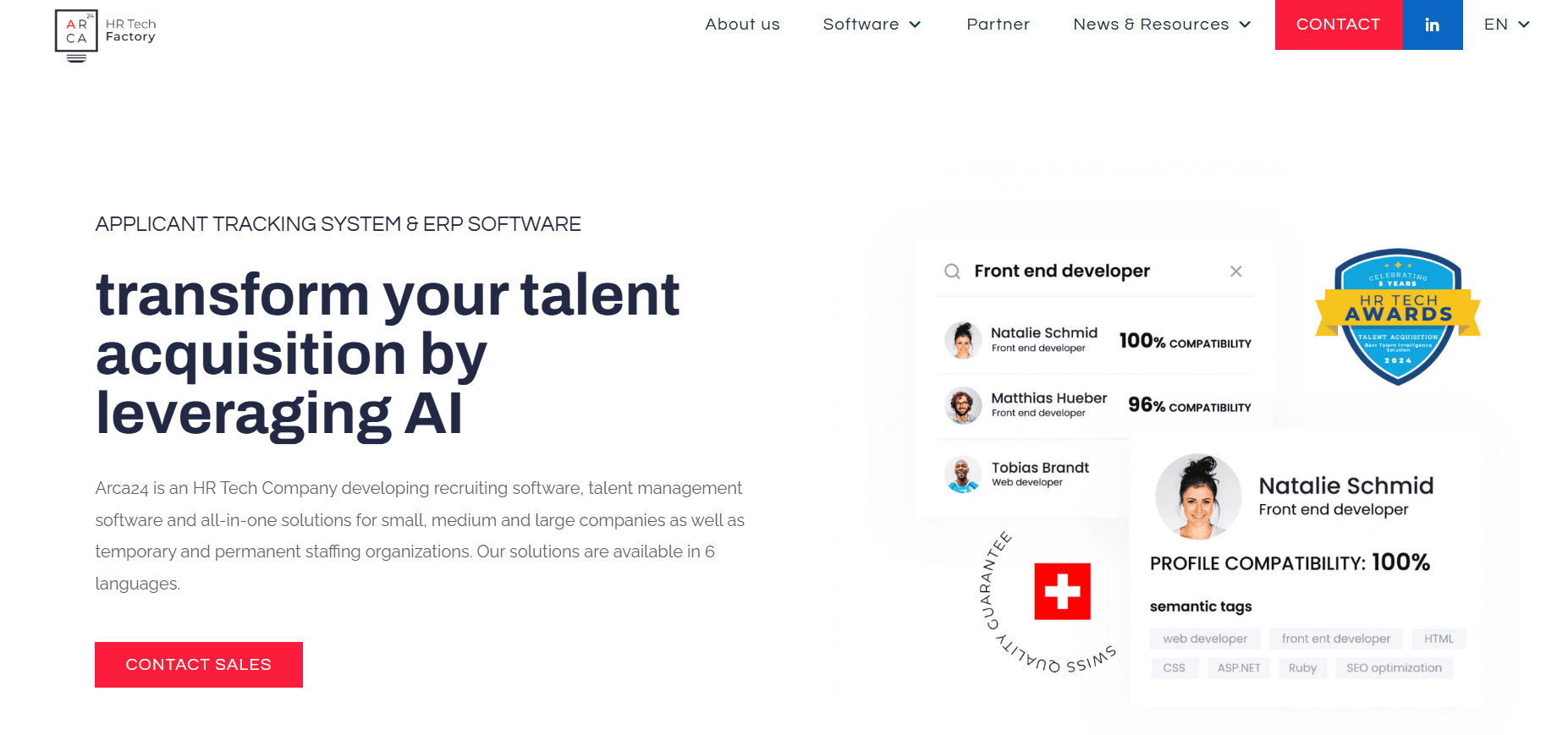
Source: JobArch
JobArch is a recruitment software that effectively facilitates and improves the hiring process. It is a tried-and-true AI-based technique for assessing soft skills that uses a semantic engine to pre-screen applicants. To help hiring managers select the best candidate for each job opening, it provides online psychometric exams and other soft skill assessments.
Features
- It has a wide range of online soft skills tests with easy-to-analyze reports.
- The core capabilities of JobArch can be integrated with a module for document management and a CRM module.
- To precisely define applicant talents and quantify candidate competencies, 37 psychological tests are administered across 4 different classes.
10. Toggl
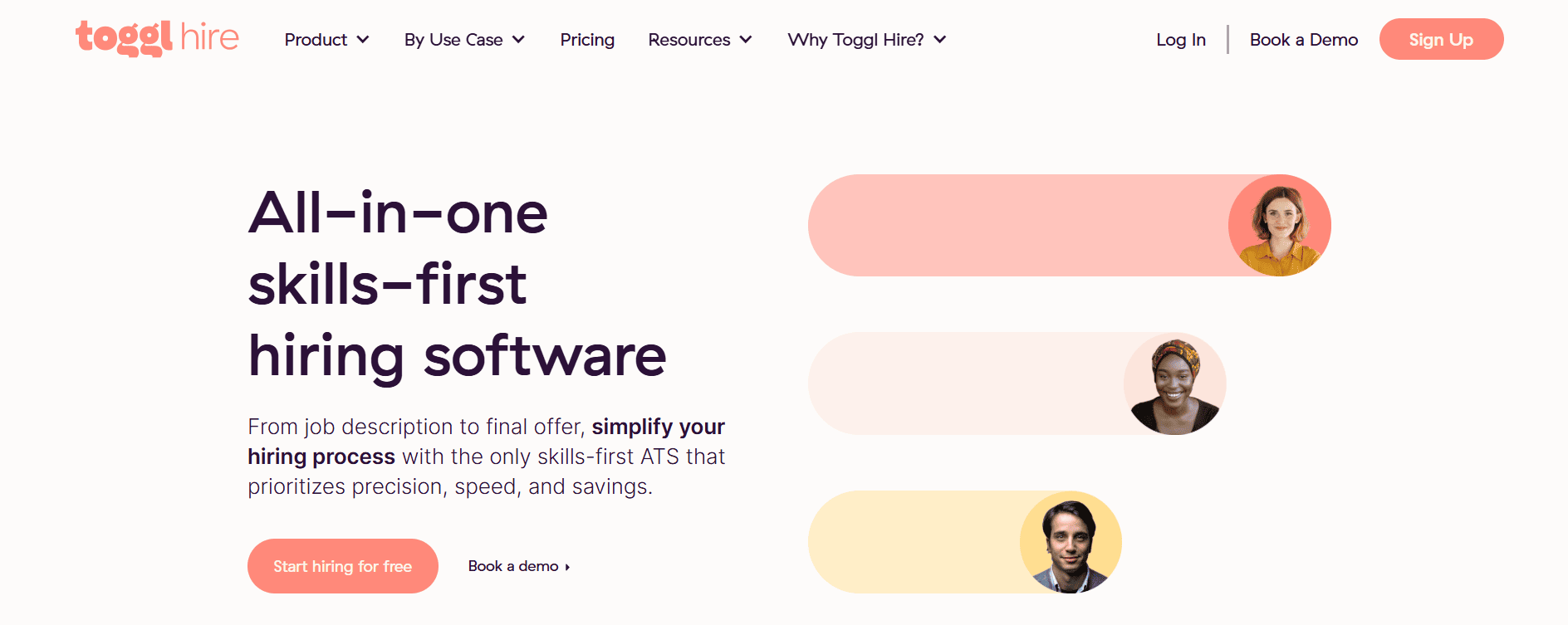
Source: Toggle
Toggle enables hiring managers to develop job-specific tests covering every step of the hiring process. The soft skills measurement tool encourages quicker, more equitable, and more efficient hiring.
Features
- It evaluates the applicant’s reliability, emotional intelligence, adaptability, work ethic, cultural fit, and teamwork abilities.
- Hire Success Integrity Assessment analyzes individuals’ personalities and gauges their propensity to be trustworthy, dependable, and accountable at work.
- Cognitive aptitude tests indicate how applicants would behave in particular circumstances. Employing managers can compile information and choose the best candidates to better prepare them for interview questions.
Conclusion
Soft skills are important assets in any business. They affect how employees, clients, and customers interact, and how successful your company will be. Soft skills are not listed on a resume. Instead, soft skills are listed as the personality traits, values, and behaviors that help people create connections, get along with other people, and feel appreciated. They are developed through life experiences and are not necessarily related to academic or professional success.
Employers use soft skills tests to determine how well their candidates will be able to work in their environment and to identify gaps that need to be filled. A business culture may be made or broken by soft skills. Soft skills tests may be more significant in this context than testing for technical proficiency.
Use a variety of soft skills assessment tests, from formal personality tests to interview questions that call for in-depth, personal responses, to get the best picture possible of how a candidate will perform on the job. You can evaluate candidates right away and steer clear of unbiased hires with the wide range of soft skills assessment tests offered by Skillrobo.
If you are looking to hire the right candidate using soft skills assessment tests, you can Sign Up with Skillrobo!

Soft skills are equally important for both higher-position employees and fresh candidates. Each level has various requirements and obligations, and the soft skills that are most crucial to develop throughout a career may change, but everyone needs them to function well at work. They are so essential that employers are increasingly looking for applicants who possess strong soft skills in addition to the technical qualifications needed for a post.
A designer may learn the workings and limitations of new graphic design software, similar to how a coder can learn a new programming language. However, if the new employee can’t speak politely and clearly, they’ll interfere with business as usual. So, soft skills are the essential thing to consider when hiring a potential employee for your team.
Every organization should identify the job role that requires soft skills and implement the soft skill assessment effectively. With soft skills assessment tools, employers can determine the candidate’s ability in specific soft skills tests. Further evaluations are done by the soft skills specialist or the employer who hired the candidate.
Examples of soft skills are critical thinking, time management, work ethic, problem-solving, teamwork, etc. Let’s take a closer look at the subject of soft skills assessment, starting with a discussion of what soft skills assessment is, as well as the types, importance, and top 10 tools available today.
What Is Soft Skills Assessment?
Soft skills assessments are designed to evaluate the candidate’s strengths and weaknesses in soft skills. This tool helps recruiters to identify the areas where the employee has to improve their soft skills which leads to the enhancement of overall performance. Additionally, it will highlight your strengths in soft skills so you may better grasp how to impart such admirable traits to others.
Usually, employers focus only on hard skills when hiring a candidate, but it is important to look deep inside the soft skills of the candidate. For team leaders and managerial personnel to manage others more successfully, soft skills are very crucial. Soft skills training should be viewed as a crucial component of the hiring process because these abilities may be acquired with the proper instruction.
Building and maintaining solid and healthy relationships with clients and coworkers requires skills like emotional intelligence and conflict management. There are several benefits to investing in employees’ soft skills by identifying and developing those who excel in hard skills.
Types Of Soft Skills
To match the demand for personalization and empathy within a client base, companies require people with great soft skills. For workers, especially employees, and contractors who work remotely, soft skills are even more essential.
1. Communication Skills
Communication skills and assessments are essential for positions like customer support and back-office roles. Any team environment can suffer greatly from a lack of good communication, and miscommunication can quickly result in unneeded disputes.
2. Problem-solving Skills
Both higher- and lower-level employees can benefit from having problem-solving abilities, such as critical thinking. There will always be challenges at work, and the recruiter doesn’t want to recruit someone whose hand they’ll have to hold every step of the way.
3. Teamwork
The rising diversity of modern business requires teamwork and an open mind to other people’s views. Some people work incredibly productively when they are themselves. But it’s important to find someone who can handle both without getting too competitive.
4. Interpersonal Skills
The term “interpersonal skills” refers to a broad range of soft talents needed to establish and maintain relationships. A person with good people skills will be able to empathize with others, respect their ideas, and successfully convey and understand constructive criticism. They will also be able to maintain a diplomatic position with everyone. In the workplace, conflicts will arise, but a person with good people skills will be able to handle the situation and find a solution without consulting upper management.
5. Work Ethic
Employees with a strong work ethic are in great demand because they are trustworthy and committed to carrying out their obligations to the best of their abilities. This entails routinely meeting deadlines and exhibiting readiness to put in extra work when required.
Importance Of Measuring Soft Skills
It is obvious that soft skills are more important than hard skills in digital technology. According to the World Economic Forum’s “Future of Jobs” report, by 2025, the workplace will place a significant emphasis on critical thinking, complex problem-solving, people management, emotional intelligence, and creativity.
Soft skills are extremely beneficial in contributing to Return on Investment (ROI), in addition to job success. They have an impact on a company’s employee retention rates since, more often than not, a technically sound hire may lack the necessary soft skills and therefore underperform.
Nowadays, when technology controls every aspect of our lives, soft skills are as desperately needed as they are important. Employers are motivated to consider soft talents while hiring because of this. The majority of businesses are prepared to provide technical training for new workers, but they favor applicants with a strong set of soft skills.
Soft skills assessment tools provide information and insights that have a positive impact on the hiring and retaining processes as well as on the engagement of the talent pool inside the organization. In turn, this gives businesses a clear advantage over rivals.
Methods To Assess Soft Skills
1. Soft Skills Self-Assessment
This tool is also known as the self-reporting tool, one of the methods of soft skill assessment that serves as a marker of soft skills including empathy, communication, teamwork, and problem-solving. The most popular ways to distribute them are through questionnaires and surveys.
2. Survey of Employee Engagement
These surveys gauge how dedicated workers are to their jobs and employers, which in turn indicates the manager’s capacity to promote positive office dynamics.
3. 360-Degree Feedback
These feedback tools are used to gather opinions from those who engage with the issue most frequently. Tools for providing feedback are quite insightful and can be very successful in assessing soft skills.
4. Developing definite Rubrics
Employers can investigate candidates’ responses to a soft skills test because of the creation of detailed rubrics that define outstanding, acceptable, and unsatisfactory degrees of soft skills. Soft skills are challenging to measure.
How Do Recruiters Assess A Candidate’s Soft Skills?
Comprehensive soft skill assessment is a well-thought-out methodology with several components. Even though soft skills are applicable in all fields and positions and are universal, some jobs call for a particular skill set.
For example, a customer support specialist necessitates better communication abilities than originality in problem-solving. Employers must therefore determine the soft skill needs of a work role to evaluate soft skills assessment tools.
Online pre-screening is the next phase, where technology helps lighten the load. Online applications can readily incorporate pre-screening techniques, such as situational inquiries or games with neuroscience themes, whose outcomes are then analyzed using the software’s algorithm.
Employers must be wary of unintentional bias while evaluating a candidate’s soft skills. Implicit biases are especially dangerous because, after the initial favor is established, employers are more likely to pay attention to characteristics that support that bias. This can be reduced by utilizing the right soft skills assessment tools in the hiring process.
Standardizing the interview questions is also an essential part of measuring soft skills. Behavioral or situational interview questions can be useful in identifying soft talents, but they must be used consistently by all applicants. This assures that each applicant has the chance to demonstrate their abilities, making it simpler for employers to compare the responses.
Problem-solving inquiries can also be used in conjunction with situational inquiries to evaluate soft skills. Using these kinds of questions, recruiters can evaluate a candidate’s aptitude for problem-solving, composure, and openness to change.
Top 10 Soft Skills Assessment Tools In the Market
1. Skillrobo

Skillrobo is a pre-employment assessment tool that evaluates candidates’ technical, domain, coding, cognitive, and soft skills before they are hired. Using scenario-based questions that are based on actual workplace interactions, these soft skills assessment tools enable hiring managers and recruiters to determine candidates’ working styles, communication skills, professionalism, cognitive ability, and ethics.
This Skillrobo soft skills testing tool has an expanding collection that includes tests for language proficiency, cognitive ability, personality, and culture.
Features
- Skillrobo pre-assessment software provides cutting-edge soft skills tests for business communications, such as Active Listening, Communication Fundamentals, Cross-Cultural Communication, Presentation, Negotiation, and Persuasion skills.
- This soft skills assessment tool provides the greatest strategies for evaluating soft skills, including adaptability, collaboration, networking, and relationship building, which are used to analyze candidates’ teamwork skills.
- The self-awareness, personal effectiveness, goal-setting, and self-growth portions of the personal development test.
- Skill sets such as problem-solving, customer focus, accountability, time management, conflict management, research skills, critical thinking, strategic planning, emotional quotient, creativity, innovation, and dependability are also important.
2. Bryq

Source: Bryq
Bryq is an upcoming soft skills assessment tool that enables efficient and objective recruiting. Using a combination of core skills and soft skill assessments, the platform strives to develop talent and assist hiring managers in finding skill sets that match.
To help the hiring manager ask the proper questions during the interview, Bryq can evaluate each candidate’s strengths, limitations, and how they stack up against their peers.
Features
- It measures the candidates’ four cognitive abilities: attention to detail, logical reasoning, verbal reasoning, and numeric reasoning.
- It provides the evaluation of behavioral trends using validated personality tests.
- Bryq includes numerous indicators, such as the addition of culture, emotional intelligence, and remote work.
3. Picked

Source: Neuroworx.io
Neuroworx.io is an AI-enabled talent acquisition application that offers a one-stop solution for hiring and managing talent. It assists hiring managers in quickly locating qualified candidates to fill urgent openings.
This tool provides a wide range of soft skills tests. With the help of approved tests, this focuses on legitimate, fair, and trustworthy recruitment.
Features
- It has the feature of integrating a 360-degree review system to manage performance.
- It provides a wide range of pre-employment aptitude tests like Emotional Intelligence, Diagrammatic Reasoning, Abstract Reasoning, Error Checking, Logical Reasoning, Mechanical Reasoning, Numerical Reasoning, Situational Judgment, Spatial Reasoning, and Verbal Reasoning.
- It provides personality tests like the Interest Inventory, the HEXACO Personality Test, and the Drives Test
4. Clevry

Source: Clevry
Using the user-friendly soft skills assessment tool Clevry, hiring managers may evaluate soft skills objectively. There are more than 46 personality tests that examine candidates’ business cultures. You can also use premade surveys that concentrate on roles relevant to a given industry.
The Clevry platform is simple to design your assessment campaigns for hiring and training purposes. Alternatively, you may hire our team of qualified recruiters and business psychologists to handle the task.
Features
- Clevry soft skills assessment tool provides standard personality questionnaires and ability tests.
- It has a 360-degree feedback feature.
- It has a feature of virtual assessment.
5. Harver

Source: Harver
Harver is an HR management software that streamlines the hiring process through AI technology and behavioral data for businesses. Employers can evaluate candidates using gamified tests and video interviews on the platform, and they can also recommend substitute jobs.
Hiring managers can assess candidates’ emotional behavior, personality traits, and cognitive abilities using pre-built behavior-based games. Additionally, the soft skills assessment tool produces personalized performance reports.
Features
- It helps employers to make decisions without bias across the talent lifecycle by surfacing soft skills data in the HR system.
- It provides the overall report of candidate performance through fair and predictive soft skills analysis data.
6. Merittrac
Merittrac is an online platform for hiring and workforce development. It provides comprehensive end-to-end solutions for businesses in addition to online assessments, admission management, and other exams for universities, government agencies, and other educational institutions.
By offering cognitive, communication, behavioral, and workforce development tests, it excels as a soft skills assessment tool.
Features
- Merittrac has a pre-employment aptitude test to evaluate candidates’ verbal, mathematical, spatial, logical, error-checking, and numerical reasoning.
- It also has psychometric tests that assess values, motivation, and cognitive and personality attributes.
7. HighMatch

Source: HighMatch
HighMatch approaches hiring evaluation in a cutting-edge manner. To provide individualized insights into candidates at every level of the employment cycle, the team works with in-house psychologists. You can discover better matches as a consequence. It is a technique for measuring soft skills that provides personality assessments to precisely forecast a candidate’s performance on the job.
Features
- The personality test in HighMatch helps to evaluate candidates more quickly and accurately for a certain culture and job.
- It assists in measuring seven distinct characteristics, including adaptability, assertiveness, optimism, intensity, sociability, reactivity, and structure.
- The situational judgment tests reveal insights about a candidate’s aptitude for dealing with difficulties effectively.
8. Retorio

Source: Retorio
Retorio blends leading-edge organizational and psychological research findings with AI and ML. Using cutting-edge video AI to uncover candidates’ personalities elevates the process of hiring and managing employees. Additionally, it offers a thorough examination of personality, job, and cultural fit.
Features
- The analytics of each candidate is added in every stage of talent management to analyze individual performance.
- Target profiling and culture evaluation, video simulations and interviews, personality analytics, and talent matching
- It mixes science and AI, measures personality, scales intuition, and examines actual behavior.
9. JobArch

Source: JobArch
JobArch is a recruitment software that effectively facilitates and improves the hiring process. It is a tried-and-true AI-based technique for assessing soft skills that uses a semantic engine to pre-screen applicants. To help hiring managers select the best candidate for each job opening, it provides online psychometric exams and other soft skill assessments.
Features
- It has a wide range of online soft skills tests with easy-to-analyze reports.
- The core capabilities of JobArch can be integrated with a module for document management and a CRM module.
- To precisely define applicant talents and quantify candidate competencies, 37 psychological tests are administered across 4 different classes.
10. Toggl

Source: Toggle
Toggle enables hiring managers to develop job-specific tests covering every step of the hiring process. The soft skills measurement tool encourages quicker, more equitable, and more efficient hiring.
Features
- It evaluates the applicant’s reliability, emotional intelligence, adaptability, work ethic, cultural fit, and teamwork abilities.
- Hire Success Integrity Assessment analyzes individuals’ personalities and gauges their propensity to be trustworthy, dependable, and accountable at work.
- Cognitive aptitude tests indicate how applicants would behave in particular circumstances. Employing managers can compile information and choose the best candidates to better prepare them for interview questions.
Conclusion
Soft skills are important assets in any business. They affect how employees, clients, and customers interact, and how successful your company will be. Soft skills are not listed on a resume. Instead, soft skills are listed as the personality traits, values, and behaviors that help people create connections, get along with other people, and feel appreciated. They are developed through life experiences and are not necessarily related to academic or professional success.
Employers use soft skills tests to determine how well their candidates will be able to work in their environment and to identify gaps that need to be filled. A business culture may be made or broken by soft skills. Soft skills tests may be more significant in this context than testing for technical proficiency.
Use a variety of soft skills assessment tests, from formal personality tests to interview questions that call for in-depth, personal responses, to get the best picture possible of how a candidate will perform on the job. You can evaluate candidates right away and steer clear of unbiased hires with the wide range of soft skills assessment tests offered by Skillrobo.
If you are looking to hire the right candidate using soft skills assessment tests, you can Sign Up with Skillrobo!

